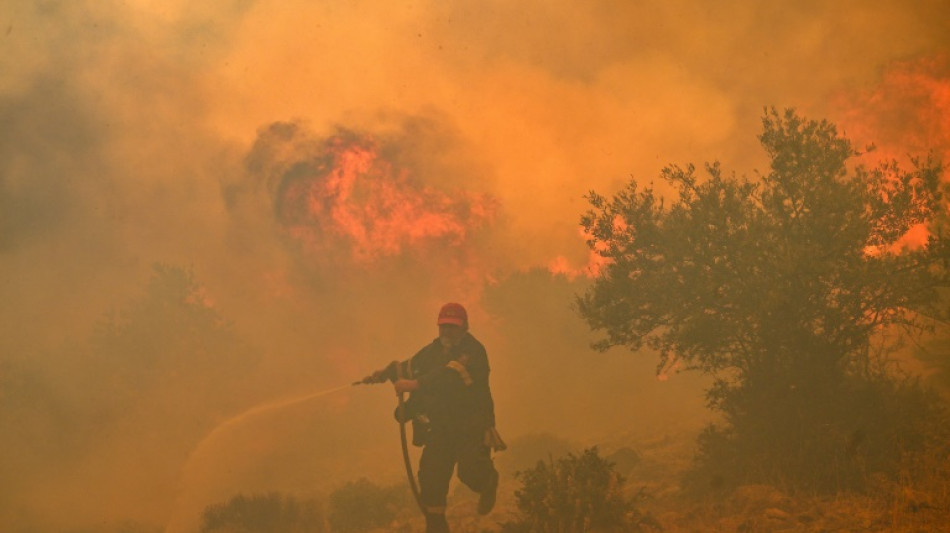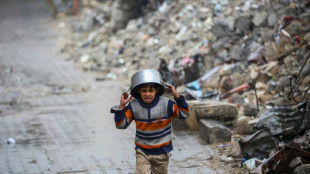
-
 French court cracks down on Corsican language use in local assembly
French court cracks down on Corsican language use in local assembly
-
Prosecutors seek up to 14-year terms for French rape trial defendants

-
 Russia expels UK diplomat accused of espionage
Russia expels UK diplomat accused of espionage
-
Israeli security cabinet to discuss ceasefire as US says deal 'close'

-
 COP29 president blames rich countries for 'imperfect' deal
COP29 president blames rich countries for 'imperfect' deal
-
Stocks retreat, dollar mixed on Trump tariff warning

-
 No regrets: Merkel looks back at refugee crisis, Russia ties
No regrets: Merkel looks back at refugee crisis, Russia ties
-
IPL history-maker, 13, who 'came on Earth to play cricket'

-
 Ukraine says Russia using landmines to carry out 'genocidal activities'
Ukraine says Russia using landmines to carry out 'genocidal activities'
-
Prosecutors seek up to 12-year terms for French rape trial defendants

-
 'Record' drone barrage pummels Ukraine as missile tensions seethe
'Record' drone barrage pummels Ukraine as missile tensions seethe
-
Laos hostel staff detained after backpackers' deaths

-
 Hong Kong LGBTQ advocate wins posthumous legal victory
Hong Kong LGBTQ advocate wins posthumous legal victory
-
Ukraine says cannot meet landmine destruction pledge due to Russia invasion

-
 Rod Stewart to play Glastonbury legends slot
Rod Stewart to play Glastonbury legends slot
-
Winter rains pile misery on war-torn Gaza's displaced

-
 'Taiwan also has baseball': jubilant fans celebrate historic win
'Taiwan also has baseball': jubilant fans celebrate historic win
-
Russia pummels Ukraine with 'record' drone barrage

-
 Paul Pogba blackmail trial set to open in Paris
Paul Pogba blackmail trial set to open in Paris
-
China's Huawei unveils 'milestone' smartphone with homegrown OS

-
 Landmine victims gather to protest US decision to supply Ukraine
Landmine victims gather to protest US decision to supply Ukraine
-
Indian rival royal factions clash outside palace

-
 Equity markets retreat, dollar gains as Trump fires tariff warning
Equity markets retreat, dollar gains as Trump fires tariff warning
-
Manga adaptation 'Drops of God' nets International Emmy Award

-
 China's Huawei launches 'milestone' smartphone with homegrown OS
China's Huawei launches 'milestone' smartphone with homegrown OS
-
Philippine VP denies assassination plot against Marcos

-
 Four Pakistan security forces killed as ex-PM Khan supporters flood capital
Four Pakistan security forces killed as ex-PM Khan supporters flood capital
-
Hong Kong's legal battles over LGBTQ rights: key dates

-
 US lawmakers warn Hong Kong becoming financial crime hub
US lawmakers warn Hong Kong becoming financial crime hub
-
Compressed natural gas vehicles gain slow momentum in Nigeria

-
 As Arctic climate warms, even Santa runs short of snow
As Arctic climate warms, even Santa runs short of snow
-
Plastic pollution talks: the key sticking points

-
 Indonesia rejects Apple's $100 million investment offer
Indonesia rejects Apple's $100 million investment offer
-
Pakistan police fire tear gas, rubber bullets at ex-PM Khan supporters

-
 Ronaldo double takes Al Nassr to brink of AFC Champions League last 16
Ronaldo double takes Al Nassr to brink of AFC Champions League last 16
-
Pakistan police fire tear gas, rubber bullets at pro-Khan supporters

-
 Hong Kong same-sex couples win housing, inheritance rights
Hong Kong same-sex couples win housing, inheritance rights
-
Indonesia digs out as flooding, landslide death toll hits 20

-
 Liverpool's old guard thriving despite uncertain futures
Liverpool's old guard thriving despite uncertain futures
-
Mbappe takes reins for Real Madrid in Liverpool clash

-
 As AI gets real, slow and steady wins the race
As AI gets real, slow and steady wins the race
-
China's Huawei to launch 'milestone' smartphone with homegrown OS

-
 Porzingis and Morant make triumphant NBA returns
Porzingis and Morant make triumphant NBA returns
-
Hong Kong top court affirms housing, inheritance rights for same-sex couples

-
 Philippines, China clashes trigger money-making disinformation
Philippines, China clashes trigger money-making disinformation
-
Most Asian markets drop, dollar gains as Trump fires tariff warning

-
 England 'not quivering' ahead of New Zealand Test challenge
England 'not quivering' ahead of New Zealand Test challenge
-
Bethell to bat at three on England Test debut against New Zealand

-
 Trump vows big tariffs on Mexico, Canada and China
Trump vows big tariffs on Mexico, Canada and China
-
New Zealand and England to play for Crowe-Thorpe Trophy


Increasingly hot European summers are harming health, report says
Heat stress in Europe is increasingly threatening people's health as global warming makes summers there hotter and deadlier, two leading climate monitors warned on Monday.
The year 2023 saw record levels of heat stress in Europe -- environmental conditions under which the human body struggles to cope, said the EU's Copernicus Climate Change Service and the UN's World Meteorological Organization (WMO) in a report.
Prolonged exposure to heat stress -- which comes not just from high temperatures but factors like humidity, wind and heat bouncing off concrete -- can seriously compromise health and even cause death.
Heat-related deaths have soared around 30 percent in the last 20 years in Europe as summer heatwaves have become longer and stronger, Copernicus and the WMO said.
"We're seeing an increasing trend in the number of days with heat stress across Europe and 2023 was no exception," said Rebecca Emerton, a climate scientist at Copernicus.
There was a record number of "extreme heat stress" days last year, she said.
"This is equivalent to a feels-like temperature of more than 46 degrees Celsius, at which point it's imperative to take actions to avoid health risks such as heat stroke," she said.
On July 23, at the peak of a summer heatwave, an unprecedented 41 percent of southern Europe was experiencing strong, very strong or extreme heat stress.
"This is the largest area of southern Europe -- and in fact Europe as a whole -- that has seen these levels of heat stress on any one day in the era of record," Emerton said.
Some parts of Spain, France, Italy, Greece and Turkey saw up to 10 days of extreme heat stress, Copernicus said.
Southern Spain, meanwhile, saw up to 80 days of very strong heat stress, it added.
- 'Extended summer' -
Heat stress is particularly dangerous for vulnerable people such as children and the elderly, outdoor workers, and those with pre-existing health conditions.
The effect is stronger in cities, where there is less vegetation to cool the air, and heat is absorbed by concrete and radiated off footpaths and buildings.
Radhika Khosla, an urban climatologist from the University of Oxford, said northern Europe in particular was "largely unprepared for any sort of extreme heat".
"Our buildings, cities, and lifestyles are built around moderate to cold temperatures. As the mercury rises due to human activity, northern Europe faces an unprecedented adaptation challenge," said the associate professor at the Smith School of Enterprise and Environment.
Summer 2023 was not the hottest in Europe -- in fact, it was the fifth -- but the continent sweltered from heatwaves during an "extended summer" between June and September, Emerton said.
September was the warmest on record for Europe as a whole, she added.
Longer and more powerful heatwaves -- coupled with ageing populations and more people moving to cities -- will have "serious consequences for public health", the report added.
Extreme heat is already the leading cause of climate-related death in Europe, and 23 of the 30 worst-recorded heatwaves on the continent have occurred this century.
The data on deaths in Europe from extreme heat in 2023 is not available yet.
But tens of thousands of people are estimated to have died due to heatwaves during equally sweltering European summers in 2003, 2010 and 2022, the report said.
"We see that there is excess mortality when we see such extreme heatwaves like was the case in 2023," said Alvaro Silva, a climatologist from the WMO.
"This increase in mortality... is affecting (the) big majority of European regions. This is a big concern."
- 'Beyond extreme' -
Scientists agree that greenhouse gas emissions are warming the planet, causing more intense and frequent extreme weather events.
A warmer atmosphere can hold greater water vapour, causing immense rain and flooding when it is released.
Europe is warming twice as fast as the global average, the report said, and apart from scorching heatwaves the continent witnessed a host of contrasting climate extremes last year.
2023 was one of Europe's wettest years, with major flooding affecting 1.6 million people, and storms another 550,000.
Glaciers in all parts of Europe saw a loss of ice, while Greece suffered the largest wildfire in the history of the EU.
Globally, it was the hottest year on record and oceans, which absorb 90 percent of excess heat produced by carbon dioxide emissions, also warmed to new highs.
Average sea surface temperatures in Europe were the warmest on record, the report said, with a severe marine heatwave in part of the Atlantic Ocean described as "beyond extreme".
Emerton said that the economic cost of these extreme events was 13.4 billion euros ($14.3 billion) -- about 80 percent attributed to flooding.
J.Fankhauser--BTB



